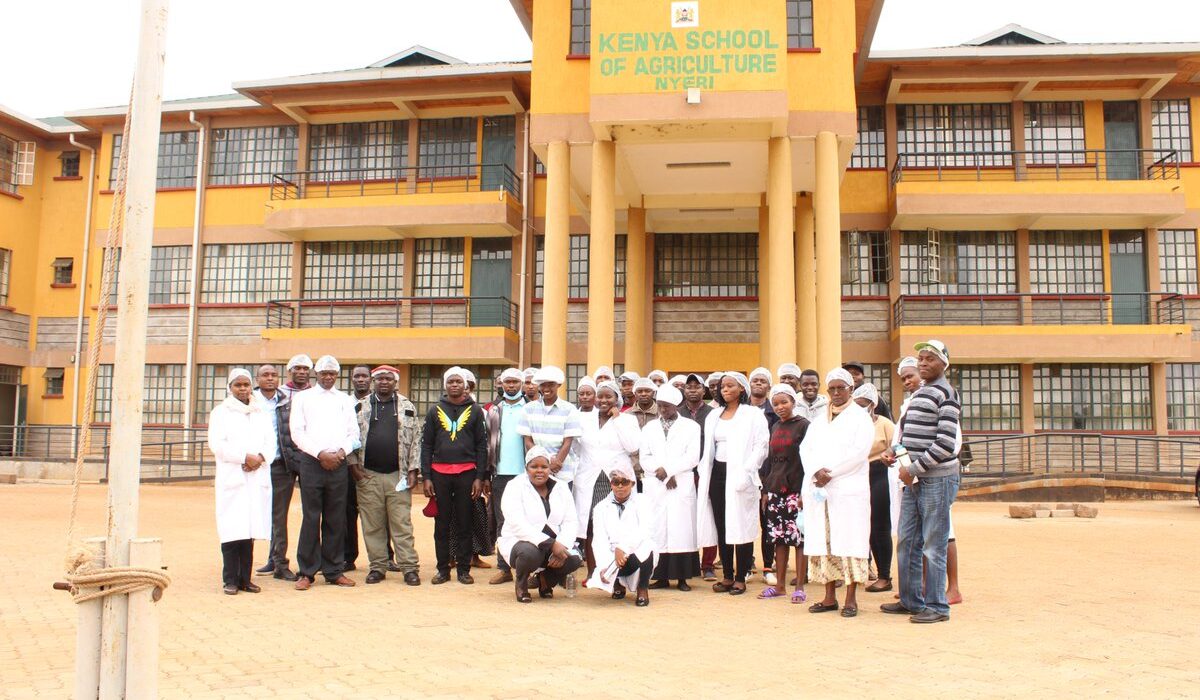The Kenya School of Agriculture (KSA), located in Machakos County, is a leading Technical and Vocational Education and Training (TVET) institution under the Ministry of Agriculture, Livestock, Fisheries, and Cooperatives. Established to address Kenya’s need for skilled agricultural professionals, KSA is part of a network of agricultural training colleges, with its main campus in Nyeri and plans for a new campus in Makueni County. KSA focuses on practical, competency-based education to support Kenya’s Vision 2030 goal of transforming agriculture into a modern, innovative, and commercially oriented sector. This article provides a detailed overview of the nine courses offered at KSA Machakos for the 2025/2026 academic cycle, admission requirements, career prospects, and why KSA is a top choice for aspiring agripreneurs and agricultural experts.
Why Choose Kenya School of Agriculture?
KSA’s Machakos campus, situated in a region where agriculture contributes 70% to household incomes, offers a strategic location for hands-on training in crop production, horticulture, and agribusiness. Here’s why KSA stands out:
- Accreditation: KSA is registered with the Technical and Vocational Education and Training Authority (TVETA) and offers programs approved by the TVET Curriculum Development, Assessment, and Certification Council (TVET-CDACC).
- Practical Training: The institute emphasizes Competency-Based Education and Training (CBET), providing students with field-based skills in modern farming techniques, agribusiness, and sustainability.
- Industry Alignment: KSA collaborates with the Kenya Agricultural and Livestock Research Organization (KALRO), the Ministry of Agriculture, and county governments to align curricula with industry needs.
- Entrepreneurial Focus: Programs like Agripreneurship and Entrepreneurial Agriculture empower graduates to start their own agribusinesses, supporting Kenya’s SME sector.
- Regional Impact: KSA’s training supports national goals like food security and climate resilience, as well as regional agricultural development in Machakos County.
This guide details the nine programs listed by the Kenya Universities and Colleges Central Placement Service (KUCCPS) for the 2025/2026 cycle, along with additional short courses offered by KSA, based on available data.
Courses Offered at Kenya School of Agriculture for 2025/2026
KSA Machakos offers a diverse portfolio of diploma, certificate, and craft programs through its departments of General Agriculture, Horticulture, and Agribusiness. The following nine courses are available for the 2025/2026 academic cycle:
1. General Agriculture Department
This department provides foundational and advanced training in agricultural practices, suitable for careers in farming, extension services, and research.
- Diploma in General Agriculture (3935722): Covers crop production, livestock management, and soil science, preparing students for roles in agricultural extension and farm management.
- Duration: 2–3 years
- Examination Body: KNEC
- Craft Certificate in General Agriculture (3935884): Entry-level training in basic farming techniques, ideal for farm supervisors and community agricultural workers.
- Duration: 1–2 years
- Examination Body: KNEC
2. Horticulture Department
This department focuses on high-value crop production, addressing the growing demand for horticultural products in domestic and export markets.
- Horticulture Production Level 6 (3935812): Advanced training in greenhouse farming, post-harvest management, and horticultural value chains, preparing students for roles in commercial horticulture.
- Duration: 2 years
- Examination Body: TVET-CDACC
3. Agribusiness and Entrepreneurship Department
This department combines agricultural skills with business acumen, fostering innovation and entrepreneurship in agriculture.
- Diploma in Entrepreneurial Agriculture (3935987): Integrates farming techniques with business management, marketing, and value addition for agribusiness entrepreneurs.
- Duration: 2–3 years
- Examination Body: KNEC
- Diploma in Sustainable Agriculture and Rural Development (3935C22): Focuses on sustainable farming practices, rural development, and climate-smart agriculture, ideal for roles in NGOs and government agencies.
- Duration: 2–3 years
- Examination Body: KNEC
- Agripreneurship Level 5 (3935752): Intermediate training in agricultural entrepreneurship, covering business planning and market linkages.
- Duration: 1 year
- Examination Body: TVET-CDACC
- Agripreneurship Level 6 (3935988): Advanced agribusiness training, emphasizing innovation and scalability in agricultural enterprises.
- Duration: 1–2 years
- Examination Body: TVET-CDACC
- Certificate in Entrepreneurial Agriculture (3935846): Entry-level course in agribusiness, focusing on small-scale farming and entrepreneurship.
- Duration: 1 year
- Examination Body: KNEC
- Certificate in Sustainable Agriculture (3935959): Covers organic farming, conservation agriculture, and sustainable land management for community-based roles.
- Duration: 1 year
- Examination Body: KNEC
Additional Short Courses
While not listed in the KUCCPS 2025/2026 cycle, KSA offers short courses (1–3 weeks) to address specific industry needs, as noted on its website:
- Horticulture Producer Level III: Practical training in horticultural crop production (TVET-CDACC, 3 months).
- Agribusiness Management: Covers financial management and marketing for farmers (1–2 weeks).
- Climate-Smart Agriculture: Focuses on drought-resistant crops and water conservation (1–2 weeks).
- Value Addition in Agriculture: Training in processing and packaging agricultural products (1–2 weeks).
- Organic Farming: Techniques for pesticide-free crop production (1–2 weeks).
These short courses are open to farmers, extension officers, and community groups, enhancing KSA’s community outreach.
Admission Requirements for KSA Courses
Entry requirements are set by the Ministry of Agriculture and align with TVETA and KNEC standards:
- Diploma Courses:
- Minimum KCSE mean grade of C-.
- Specific subjects: C- in Biology, Agriculture, or Chemistry; C- in Mathematics or Business Studies for agribusiness programs.
- Craft Certificate and Certificate Courses:
- Minimum KCSE mean grade of D plain or D+.
- KCPE certificate with relevant experience may be considered for some programs.
- Level 5 and 6 Courses (TVET-CDACC):
- Level 5: KCSE mean grade of D plain or a relevant Level 4 qualification.
- Level 6: KCSE mean grade of C- or a relevant Level 5 qualification.
- Short Courses:
- No formal KCSE requirement; basic literacy and interest in agriculture suffice.
- Additional Requirements:
- National ID or birth certificate.
- Certificate of Good Conduct.
- Medical certificate for field-based programs.
- Application fee: KES 500.
Applicants must submit:
- KCSE/KCPE result slips.
- Completed application form (available at ksa.ac.ke).
- Passport-size photographs.
- Proof of application fee payment.
How to Apply to Kenya School of Agriculture
- Download the Application Form: Access the form at ksa.ac.ke or request via info@ksa.ac.ke.
- Complete the Form: Specify the program (e.g., Diploma in General Agriculture) and attach required documents.
- Pay the Application Fee: Use M-Pesa or bank transfer (KES 500, details on the website).
- Submit the Application: Email to info@ksa.ac.ke or post to P.O. Box 1909–10100, Nyeri (indicate Machakos campus).
- KUCCPS Application: For listed programs, apply via students.kuccps.net during the placement cycle (March 28–April 30, 2025).
- Await Confirmation: Admission letters are sent via email or post.
Fee Structure and Funding Options
Fees vary by program and duration:
- Diploma Programs: KES 20,000–30,000 per term.
- Certificate and Craft Programs: KES 15,000–20,000 per term.
- Level 5 and 6 Programs: KES 15,000–25,000 per year.
- Short Courses: KES 5,000–10,000 per course.
- Additional Costs:
- Application fee: KES 500.
- Accommodation (optional): KES 10,000–15,000 per term.
- Examination fees: Vary by program.
Government capitation through KUCCPS subsidizes tuition for regular students. Students can apply for Higher Education Loans Board (HELB) loans or scholarships from the Ministry of Agriculture, KALRO, or county governments. For detailed fee structures, contact KSA at +254 723 446 773 or download from ksa.ac.ke.
Career Prospects and Industry Impact
KSA graduates are well-equipped to contribute to Kenya’s agricultural transformation, addressing food security, climate change, and economic growth. Career paths include:
- General Agriculture: Agricultural extension officers, farm managers, and agronomists in government, NGOs, and private farms.
- Horticulture: Horticulturalists, greenhouse managers, and exporters in Kenya’s flower and vegetable markets.
- Agribusiness: Agripreneurs, agribusiness consultants, and cooperative managers in value chains like dairy, poultry, and crops.
- Sustainable Agriculture: Sustainability officers and rural development specialists in organizations like FAO and World Vision.
KSA’s CBET approach ensures graduates are job-ready or capable of starting their own agribusinesses, supporting Machakos County’s goal of food security and economic empowerment.
Why KSA is a Top Choice for 2025/2026
- Specialized Agricultural Focus: Nine programs tailored to agriculture and agribusiness meet regional and national needs.
- Strategic Location: Machakos’ agricultural hub offers practical training opportunities in crop and livestock production.
- Entrepreneurial Training: Emphasis on agripreneurship fosters self-employment and innovation.
- Climate-Smart Approach: Programs like Sustainable Agriculture address climate change challenges.
- Government Support: Plans to modernize the Machakos Agricultural Training Centre enhance KSA’s facilities.
Kenya School of Agriculture in Machakos County is a premier TVET institution, offering nine programs for the 2025/2026 cycle, from diplomas in General Agriculture to certificates in Sustainable Agriculture. With its practical, industry-aligned training, entrepreneurial focus, and strategic location, KSA equips students to drive Kenya’s agricultural sector forward. Apply today through ksa.ac.ke or the KUCCPS portal to join a hub of agricultural innovation.
For more information, contact:
- Phone: +254 723 446 773, +254 724 256 027
- Email: info@ksa.ac.ke
- Address: P.O. Box 1909–10100, Nyeri (specify Machakos campus)
- Website: ksa.ac.ke





